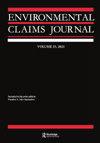气候变化对印度尼西亚巴乔部落土著人民和适应能力的影响
Q3 Environmental Science
引用次数: 14
摘要
摘要土著人民有着悠久的历史,与地球资源有着深厚的联系,他们对气候变化的影响有着深刻的理解和观察能力。传统生态知识和部落经验在制定未来适应影响的科学解决方案方面发挥着关键作用。这篇综述探讨了世界土著社区的气候相关问题,包括传统知识、森林和生态系统、粮食安全和传统食品的损失,以及水、北极海冰的损失、永久冻土的融化和迁移。直到21世纪,土著人民一直被视为气候变化影响的受害者,而不是环境保护的推动者。事实上,自2008年以来,土著人民的代表一直在积极寻求发挥作用,通过参加国际环境会议,以及通过地方和国家层面的积极行动和政治参与,为应对气候变化做出贡献。本文以厄瓜多尔东部亚马逊地区为例,认为土著人民,特别是森林居民,在应对气候变化方面具有双重作用。多年来,巴乔部落建立了适应机制来应对气候变化。在最近10 多年来,土著人民代表一直集体参与游说,争取将其纳入政府间气候变化谈判,并在联合国拥有决策权。本文试图回顾土著人民在气候变化中的作用及其适应机制。本文章由计算机程序翻译,如有差异,请以英文原文为准。
Impact of Climate Change on Indigenous People and Adaptive Capacity of Bajo Tribe, Indonesia
Abstract With a long history and deep connection to the Earth’s resources, indigenous peoples have an intimate understanding and ability to observe the impacts linked to climate change. Traditional ecological knowledge and tribal experience play a key role in developing future scientific solutions for adaptation to the impacts. This review explores climate-related issues for indigenous communities in the world, including loss of traditional knowledge, forests and ecosystems, food security and traditional foods, as well as water, Arctic sea ice loss, permafrost thaw and relocation. Until the 21st century, indigenous peoples were viewed as victims of the effects of climate change, rather than as agents of environmental conservation. Representatives of indigenous peoples have in fact since 2008 been actively seeking a role in contributing to combating climate change through their participation in international environmental conferences, as well as by means of activism and political engagement at local and national levels. Using examples from the Amazonian region in the east of Ecuador, home to indigenous communities such as the Huaorani, Sápara and Sarayaku Kichwa origin peoples, this article argues that indigenous peoples, particularly forest dwellers, have a dual role in combating climate change. Over the years Bajo tribe have made adaptive mechanisms to cope with climate change. In the last 10 years indigenous peoples representatives have been collectively engaged in lobbying for inclusion in intergovernmental climate change negotiations and to have decision-making power at the United Nations. This article is an attempt to review the role of indigenous people in climate change and their adaptive mechanisms.
求助全文
通过发布文献求助,成功后即可免费获取论文全文。
去求助
来源期刊

Environmental Claims Journal
Environmental Science-Management, Monitoring, Policy and Law
CiteScore
2.20
自引率
0.00%
发文量
10
期刊介绍:
The Environmental Claims Journal is a quarterly journal that focuses on the many types of claims and liabilities that result from environmental exposures. The ECJ considers environmental claims under older business insurance policies, coverage and claims under more recent environmental insurance policies, as well as toxic tort claims. Exposures and claims from all environmental media are considered: air, drinking water, groundwater, soil, chemicals in commerce and naturally occurring chemicals. The journal also considers the laws, regulations, and case law that form the basis for claims. The journal would be of interest to environmental and insurance attorneys, insurance professionals, claims professionals, and environmental consultants.
 求助内容:
求助内容: 应助结果提醒方式:
应助结果提醒方式:


